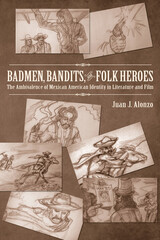2 books about Literature Film

Badmen, Bandits, and Folk Heroes
The Ambivalence of Mexican American Identity in Literature and Film
Juan J. Alonzo
University of Arizona Press, 2009
Badmen, Bandits, and Folk Heroes is a comparative study of the literary and cinematic representation of Mexican American masculine identity from early twentieth-century adventure stories and movie Westerns through contemporary self-representations by Chicano/a writers and filmmakers. In this deeply compelling book, Juan J. Alonzo proposes a reconsideration of the early stereotypical depictions of Mexicans in fiction and film: rather than viewing stereotypes as unrelentingly negative, Alonzo presents them as part of a complex apparatus of identification and disavowal. Furthermore, Alonzo reassesses Chicano/a self-representation in literature and film, and argues that the Chicano/a expression of identity is characterized less by essentialism than by an acknowldgement of the contingent status of present-day identity formations.
Alonzo opens his provocative study with a fresh look at the adventure stories of Stephen Crane and the silent Western movies of D. W. Griffith. He also investigates the conflation of the greaser, the bandit, and the Mexican revolutionary into one villainous figure in early Western movies and, more broadly, traces the development of the badman in Westerns. He newly interrogates the writings of Américo Paredes regarding the makeup of Mexican masculinity, and productively trains his analytic eye on the recent films of Jim Mendiola and the contemporary poetry of Evangelina Vigil.
Throughout Badmen, Bandits, and Folk Heroes, Alonzo convincingly demonstrates how fiction and films that formerly appeared one-dimensional in their treatment of Mexicans and Mexican Americans actually offer surprisingly multifarious and ambivalent representations. At the same time, his valuation of indeterminacy, contingency, and hybridity in contemporary cultural production creates new possibilities for understanding identity formation.
Alonzo opens his provocative study with a fresh look at the adventure stories of Stephen Crane and the silent Western movies of D. W. Griffith. He also investigates the conflation of the greaser, the bandit, and the Mexican revolutionary into one villainous figure in early Western movies and, more broadly, traces the development of the badman in Westerns. He newly interrogates the writings of Américo Paredes regarding the makeup of Mexican masculinity, and productively trains his analytic eye on the recent films of Jim Mendiola and the contemporary poetry of Evangelina Vigil.
Throughout Badmen, Bandits, and Folk Heroes, Alonzo convincingly demonstrates how fiction and films that formerly appeared one-dimensional in their treatment of Mexicans and Mexican Americans actually offer surprisingly multifarious and ambivalent representations. At the same time, his valuation of indeterminacy, contingency, and hybridity in contemporary cultural production creates new possibilities for understanding identity formation.
[more]

Feminist Medievalisms
Embodiment and Vulnerability in Literature and Film
Usha Vishnuvajjala
Arc Humanities Press, 2024
This book examines feminist textual and cinematic engagements with the idea of the Middle Ages in the nineteenth and twentieth centuries, arguing that the idea of the medieval past is central to the work of novelists and directors interested in embodiment and vulnerability. Careful and illuminating analysis of particular moments in fiction, film, and political discourse dismantles the false binary between popular and intellectual medievalisms, which rests on gendered understandings of genre and audience, while demonstrating that masculinist or patriarchal medievalisms have an equal but understudied counterpart.
The book's first three chapters cover Jane Austen’s Northanger Abbey and its afterlives, the final works of Virginia Woolf, and late twentieth-century film and music videos from the United States. The final chapter examines the treatment of women's bodies and vulnerability in both political theory and recent electoral politics, arguing that they share a common thread of misogyny rooted in the idea of the medieval past, and that one way to challenge that misogyny is by looking at complex feminist engagements with that same past, both real and imagined.
[more]
READERS
Browse our collection.
PUBLISHERS
See BiblioVault's publisher services.
STUDENT SERVICES
Files for college accessibility offices.
UChicago Accessibility Resources
home | accessibility | search | about | contact us
BiblioVault ® 2001 - 2024
The University of Chicago Press









